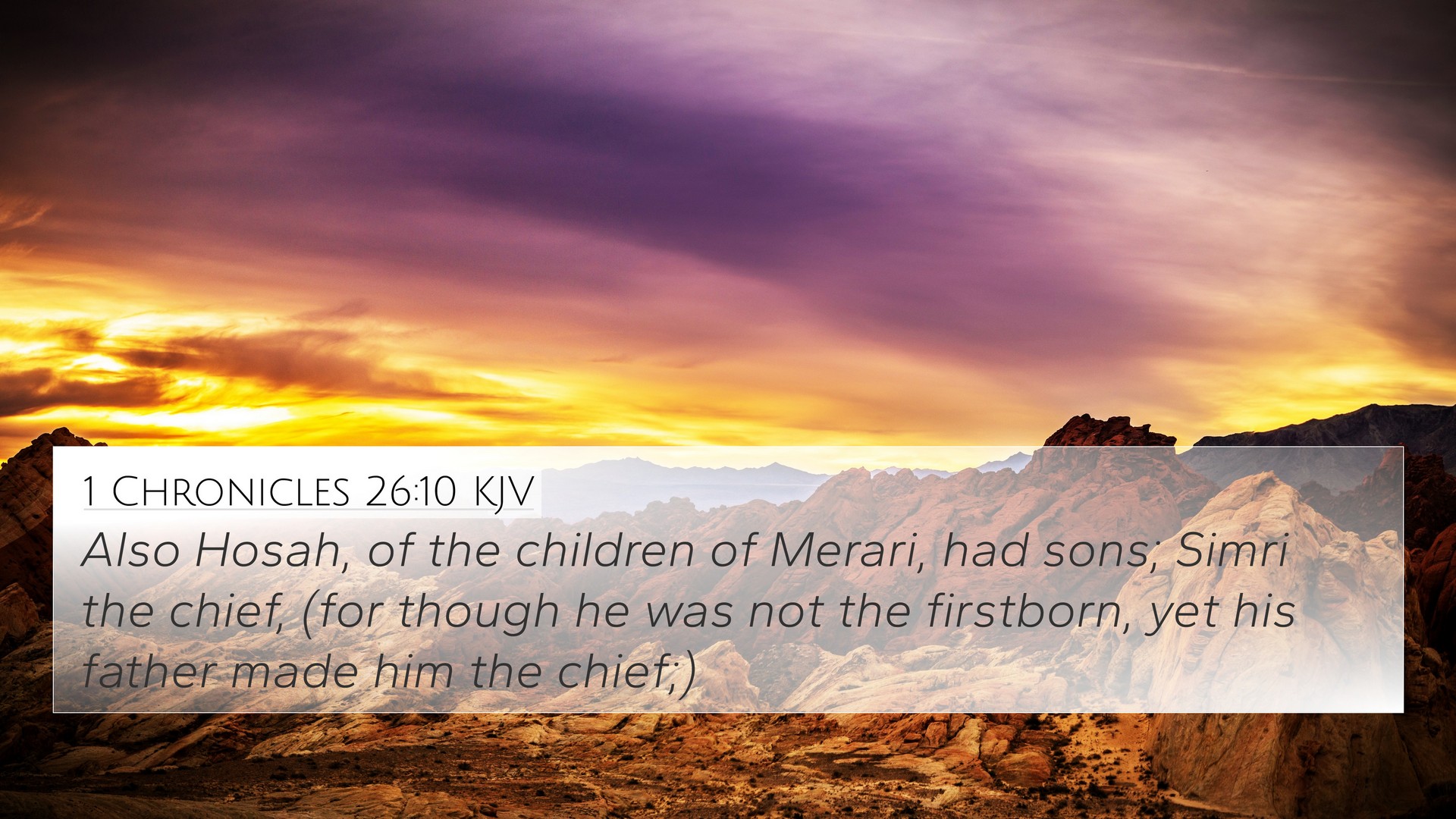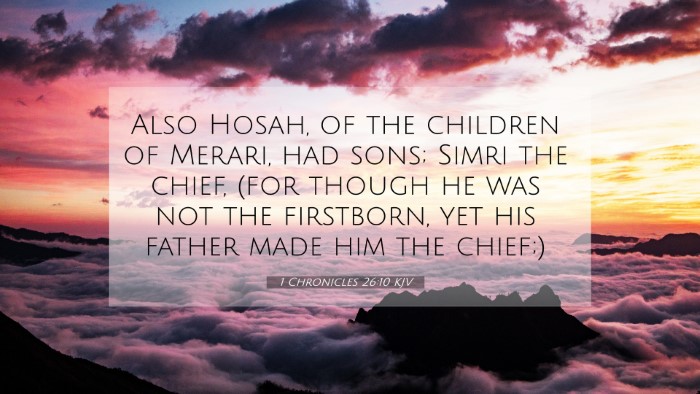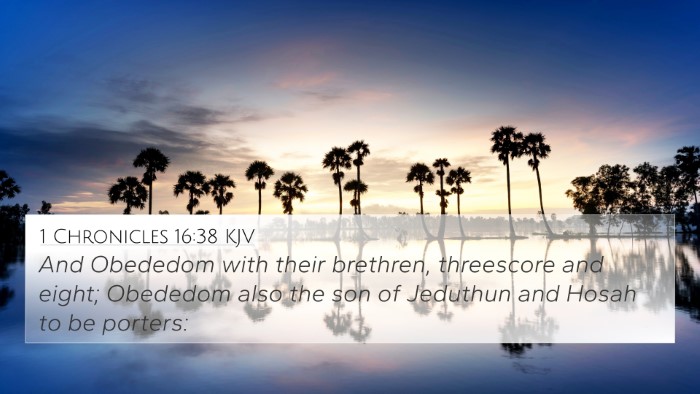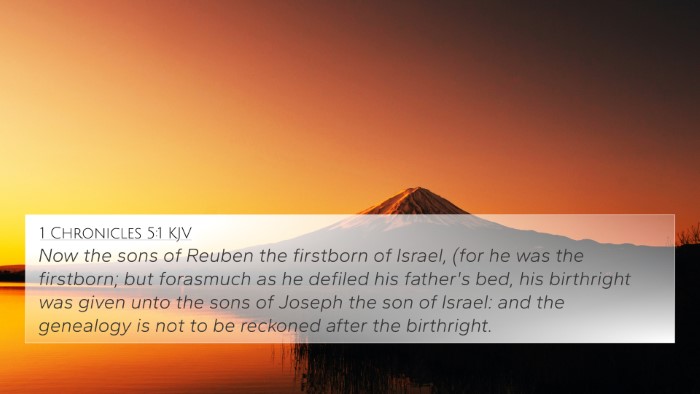Understanding 1 Chronicles 26:10
1 Chronicles 26:10 states: "And Hosah, of the children of Merari, had sons; Simri the chief, (for though he was not the firstborn, yet his father made him chief;)". This verse offers a glimpse into the organization of the Levitical families and their roles in the service of the Temple, particularly highlighting the importance of lineage and leadership.
Commentary Summary
This verse serves as a notable reference within the broader narrative of the duties assigned to the Levites during the reign of King David. Public domain commentaries provide several insights into its meaning:
- Matthew Henry's Commentary:
Henry emphasizes the significance of divine order in establishing roles within the sanctuary service. The naming of leaders like Simri, despite not being the firstborn, showcases God's sovereign selection in bestowing leadership, reminding us that God's choices do not always align with human expectations.
- Albert Barnes' Notes:
Barnes points out that the Levites were crucial in assisting the priests and managing the Temple. This particular mention of Hosah and Simri is part of a larger genealogical context that illustrates both the structure and continuity of worship practices in ancient Israel.
- Adam Clarke's Commentary:
Clarke provides an analysis of the familial responsibilities associated with the Levitical duties, indicating that although Simri was not the firstborn, he was chosen for leadership due to specific qualifications or abilities, again highlighting the divine principle of merit over birthright.
Thematic Connections
This verse appears within a broader framework of themes such as divine selection, leadership within the Church, and the importance of heritage in understanding religious responsibilities.
Cross-References
Here are several relevant Bible verse cross-references that are related to 1 Chronicles 26:10:
- 1 Chronicles 23:10: “And the Levites were numbered from thirty years old and upward: and their number by their polls, man by man, was thirty and eight thousand.” - Emphasizes the organizational structure of the Levites.
- Numbers 3:6-10: “Bring the tribe of Levi near, and present them before Aaron the priest, that they may minister unto him.” - Further illustrates the role of the Levites.
- Exodus 6:18: “And the sons of Kohath; Amram, and Izehar, and Hebron, and Uzziel; and the years of the life of Kohath were an hundred and thirty and three years.” - Highlights genealogies among the Levitical tribes.
- 2 Samuel 8:18: “And Benaiah the son of Jehoiada was over both the Cherethites and the Pelethites; and David's sons were chief rulers.” - Considers the leadership roles similar to that of Simri.
- Hebrews 7:14: “For it is evident that our Lord sprang out of Juda; of which tribe Moses spake nothing concerning priesthood.” - Connects the themes of lineage and priestly duty.
- 1 Peter 2:9: “But ye are a chosen generation, a royal priesthood, an holy nation, a peculiar people...” - Relates to the concept of God's chosen leadership among His people.
- Romans 9:11: “(For the children being not yet born, neither having done any good or evil, that the purpose of God according to election might stand, not of works, but of him that calleth;)” - Discusses the divine choice independent of human merit.
Practical Applications
From this verse, we can derive several lessons about leadership and service:
- Divine Selection: It reiterates the importance of taking on roles that God has chosen for us, which may not always align with social or familial expectations.
- Faithfulness in Service: Like the Levites, we are called to be diligent in our responsibilities and support the work of the Kingdom.
- Heritage and Identity: Understanding our spiritual lineage helps us appreciate the continuity of faith and our place in God’s family.
Conclusion
1 Chronicles 26:10 captures the essence of God's deliberate choice in leadership, the intricate organization of priestly duties, and the faithfulness required in serving the Lord. Through cross-referencing Bible verses and analyzing scriptural contexts, believers are invited to explore deeper connections within Scripture that affirm their calling and identity in Christ.




